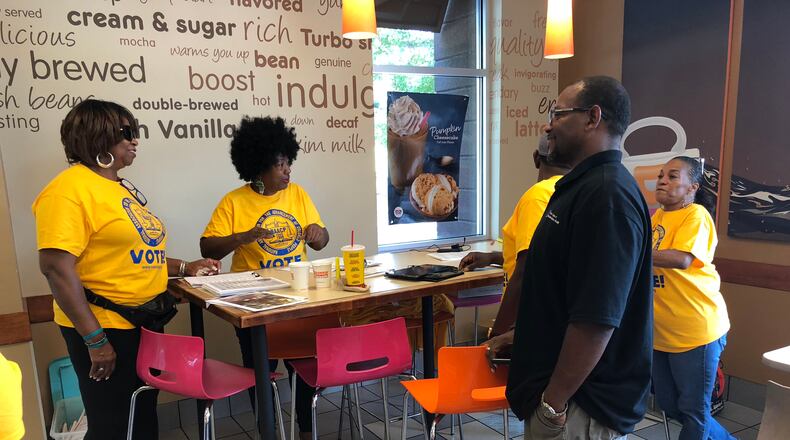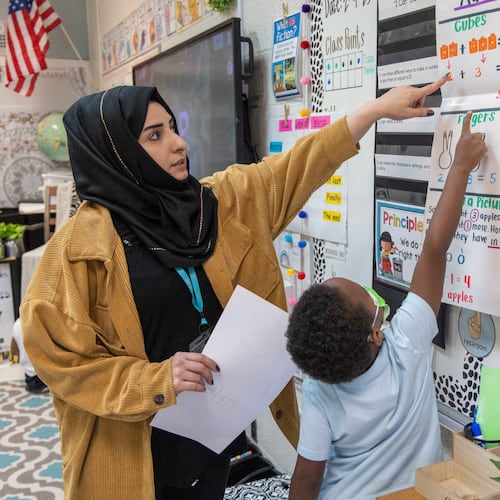On a recent Saturday, Junior Jackson went door to door in search of an elusive target: Minority residents who'd been purged from Georgia's voting rolls.
Armed with the names of dozens of potential voters put together by the Clayton County’s NAACP outreach program, “Operation Reclaiming My Vote,” he was part of a small army of hundreds of voter outreach volunteers who were working furiously across the state in the run up to this week’s voter registration deadline.
They’ve been targeting communities, such as Clayton, where a concentration of minority residents live. Looming large in the push is the possibility of electing Stacey Abrams to be Georgia’s first African American governor.
African Americans, Latinos and Asians made up a disproportionate number of the more than 668,000 Georgians that Secretary of State and gubernatorial candidate Brian Kemp removed from the voter rolls last year. All told Kemp's office has removed more than 1 million from voter rolls since he became secretary of state in 2010.
Kemp’s office pushed back at the suggestion that the state would make it more difficult for any Georgian to vote.
“Not a single voter whose status is pending for failure to verify will get rejected this election cycle,” Kemp said in a statement in August. “Despite any claim to the contrary, it has never been easier to register to vote in Georgia and actively engage in the electoral process.”
But the transient nature of lower income and immigrant populations has added to the challenge of re-registering voters. Clayton, for instance, was the hardest hit county in metro Atlanta during the foreclosure crisis, which devastated formerly stable neighborhoods in the south metro community.
“This area has a lot of rental property now,” Jackson said. “That’s had a tremendous impact on reaching people.”
The state reported Wednesday that more than 250,000 new voters have registered to cast ballots since registration deadlines for the primaries earlier this year, a number that is expected to grow because of outstanding mailed applications that still had not yet made it to the Secretary of State’s office. A record 6.9 million Georgians are now registered to vote, up from 6.5 million four years ago.
African Americans made up almost 42 percent of those who have already cast a ballot by mail, while white voters had cast about 44 percent of mailed ballots, according to website GeorgiaVotes.com.
On Tuesday, the Associated Press reported that 53,000 voter registration applications are on hold because of a state law that requires voter information verification. A disproportionate number on the list — 70 percent — are voter applications from African Americans.
Voters can have their registrations cancelled for various reasons, including relocating out of state, a felony conviction, a declaration of mental incompetence or death. Others may be put on a controversial “inactive” list because they have not voted in at least two recent elections.
The NAACP says that restoring eligible voters in places like Clayton, where more than 17,300 voters were names were taken off the rolls in 2017, could make the difference in a close election.
“What we recognized from the 2016 election is that if black voters had voted in the same percentages as white voters … another 236,000 votes would have been cast, which might have changed the outcome for Georgia,” Atlanta NAACP head Richard Rose said.
The effort to restore voters to the rolls is part of a broad-based outreach to find untapped eligible voters across the state. Groups have worked across platforms, from engaging churches through Voter Sabbaths to emphasizing voting by mail for millennials for whom convenience is paramount.
While the organizations stress that their efforts are non-partisan, they acknowledge that Abrams candidacy has been a carrot for many voters.
“We focus on issues,” said Clayton NAACP chapter president Cheryl Synamon Baldwin. “If I tell you that health care is an issue for the NAACP. If I tell you that redistricting is an issue for the NAACP, I don’t have to tell you who to vote for.”
New Georgia Project focused on signing up 300,000 minority voters in a wide-ranging effort that included a registration drive at 75 locations in 20 counties on National Voter Registration Day Sept. 25. The Urban League of Greater Atlanta focused on educating those with criminal records about their rights to go to the polls while an additional group targeted 18-year-olds, pointing out that 17 million of the young adults become eligible to vote every two years.
The effort is critical, said New Georgia Project Executive Director Nse Ufot. Traditional registration methods, such as signing up at driver's license offices, are not as effective in African American and Latino communities.
“African-Americans and Latinos are twice as likely as their white counterparts to be registered via a voter-registration drive,” she said.
Organizations also expect religious organizations to play a major role in the outreach, especially in the African American community. Faith in Action, a Washington-based group, has helped train and organize churches across the nation to register and mobilize voters through webinars and on-the-ground support in communities.
“It’s rooted in a set of values that is part of our faith commitment to go out and transform the world,” said Joseph Fleming, who works with Faith in Action’s clergy organizing team.
The efforts were not limited to ground games. Atlanta firm Metrics Marketing launched radio and TV spots to encourage black Georgians to register to vote. The campaign, dubbed “No Excuses,” addressed reasons some African Americans give for not going to the polls, including a belief that their vote won’t count, that the system is rigged or that they don’t like any of the candidates.
Historically voting advocates would try to reach these voters by using images of civil rights heroes, such as Martin Luther King Jr., to emphasize the fight others waged for them to vote, said Sarah Lattimer Irvin, Metrics CEO and president. Metrics approach was to make it clear that their concerns had been heard, but that voting is too important for them to sit on the sidelines.
“You watch the video or you hear the radio and you think, ‘Oh my god, that’s me,’” she said. “We wanted to find a way to encourage people to vote so that the future of our communities is not left up to other people.”
About the Author
Keep Reading
The Latest
Featured


